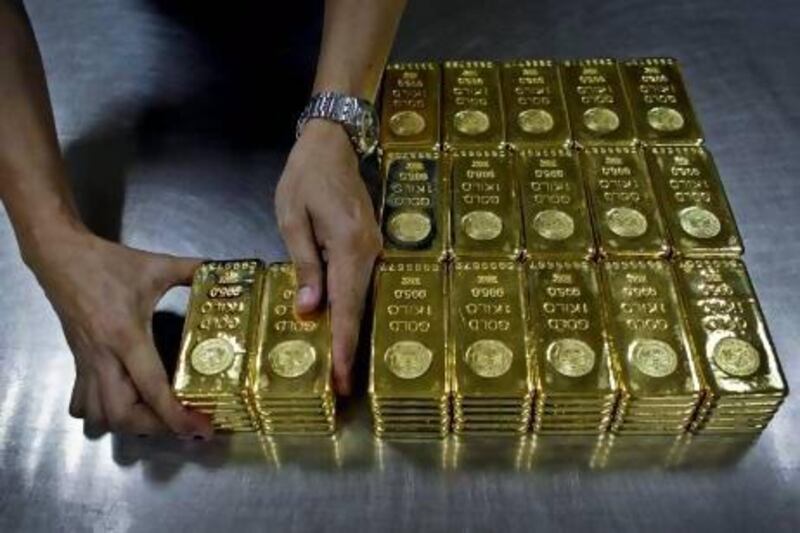Gold helped to lift the UAE's exports by 45 per cent in the first seven months of last year with the precious metal accounting for more than half of the value of the non-oil goods exiting the country.
Total exports reached Dh94.7 billion (US$25.78bn), up from Dh65bn in the same period of last year, data released by the Federal Customs Authority last week showed.
Gold accounted for Dh52.8bn of that amount, far higher than the next most valuable export, polymers, which made up Dh4.3bn.
The metal's dominance in trade reflects the rise in prices. Prices finished 7 per cent higher last year, the 12th year in a row of rises. Still the gain was the smallest yearly one since 2008.
"What is interesting is that despite the rise in the price of gold there has been an increase in exports," said Ashraf Mahate, the head of export intelligence at the Dubai Department of Economic Development "Our analysis leads us to believe that in the final quarter of 2012 the exports of gold have risen even further."
Mr Ashraf said the gains could be affected by import duties imposed on gold by India, one of the country's key trading partners. India this month raised import taxes on gold from 4 to 6 per cent in an effort to dampen the country's huge appetite for the yellow metal.
Behind gold, polymers of ethylene was the next most valuable export.
Polymers used to make packaging, car parts and piping, unwrought aluminium and copper wires all featured in the top 10 most valuable commodities exported in the first seven months last year, according to the FCA.
None featured in the top 10 exports in 2008, the earliest year for which detailed non-oil data are available. Gold also topped the value of imports to the country, reflecting the UAE's status as a leading centre for the trade of the commodity.
Re-exports from the UAE fell during the first seven months of last year by 6 per cent to Dh119.1bn. Traditionally, re-exports have been an important cornerstone of the emirate's non-oil trade, often accounting for a greater value than direct exports.
The extent of the rise in exports signals the impact of the uncertainty in the global economy last year was limited.
A total of 38.2 per cent of exports headed to Europe, a market beset by low growth linked to the global financial crisis.
But Asia, Australasia and the Pacific Islands made up 36.3 per cent. Nearly 21 per cent were headed to North Africa and the Middle East.
"The UAE's export markets can be classified into three market categories, namely the traditional markets, which include India, Pakistan and its GCC neighbours where firms have had very good historical trading relationships," said Mr Mahate.
"The growth markets, which offer UAE-based firms opportunities to tap into countries which are experiencing growth. Third, UAE based firms have been successful in penetrating the mature European markets such as Switzerland."
The data showed Dubai ports continue to dominate trade. More than three quarters of trade went through the emirate's ports, with Abu Dhabi accounting for 15.1 per cent of trade.
In the coming years, the UAE Government is keen to raise the level of sophistication of exports to include more capital goods. Used in the manufacture of other products, capital goods such as machinery, components and tools require a higher degree of technology and expertise to make. Their "added value" usually generates a higher return for an economy than more basic exports. "The more you can tap into a higher value-added economy the more you can create jobs and higher growth," said Jean-Michel Saliba, an economist at Bank of America Merrill Lynch.
"The UAE and the GCC started in a capital and labour-intensive way to build the supply side of the economy and there now needs to be a higher-value downstream created."





